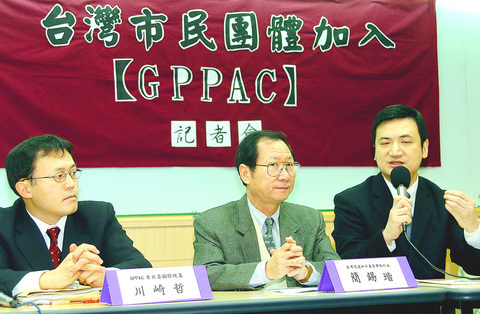Ten non-governmental organizations (NGOs) announced yesterday that they have joined the Global Partnership for the Prevention of Armed Conflict (GPPAC), an international civic movement aimed at promoting peace.
"GPPAC is perhaps the largest peace-building organization in the world. Wars are usually initiated by a nation's government, which the people have no control over. How-ever, being the global citizens we are today, civilians should have a voice about wars," said Chien Hsi-chieh, executive director of Peacetime Foundation of Taiwan.

PHOTO: GEORGE TSORNG, TAIPEI TIMES
The anti-Iraqi war movement in 2003, Chien pointed out, was a good example of an anti-war movement that lacked in overall organization and structure, as most of the activities occurred online.
As a result, although the anti-war voices of civilians were strong, they had little impact on a government's decision to wage war.
GPPAC was formed in response to the call by UN Secretary-General Kofi Annan in 2003 for a worldwide conflict-prevention community.
Other groups that joined GPPAC include the Awakening Foundation, Taiwan Security Research Center, Taiwan Labor Front, Taiwan Environmental Protection Union, Alliance for Peace Homeland and Youth Rights Alliance.
Philip Yang (
"GPPAC operates according to the concept of `human security,' where the ultimate goal is not the security of a country, but the safety of individuals," he said.
According to Yang, one example of a successful security movement promoted by NGOs was the anti-landmine campaign in 1997. Every country in the Northeast Asia region, with the exception of North Korea, has joined this movement.
This region alone, the 10 groups said, makes up one-quarter of world's population and encompasses several sensitive military issues and post-war problems such as the conflicts between the two Koreas, Pyongyang's nuclear threat, cross-strait relations, Japan-Russia territorial issues and the Tiaoyutai Islands dispute between Taiwan and Japan.
Akira Kawasaki, a member of the executive committee of Japan's Peace Boat and a representative of GPPAC Northeast Asia region, said the security of one country affected the rest of the region.
"It is like a chain reaction. For instance, if North Korea decides to ratchet up its military armament, then Japan is going to follow suit," he said.
GPPAC representatives from Northeast Asia are scheduled to meet in Tokyo next month to set a regional agenda. According to Chien, cross-strait relations has been an off-limits topic at previous meetings with China's GPPAC members, but it might be brought up in future conferences.
"We look forward to having a sit-down dialogue with China's civic groups to resolve cross-strait conflicts by peaceful measures," Chien said.

An essay competition jointly organized by a local writing society and a publisher affiliated with the Chinese Communist Party (CCP) might have contravened the Act Governing Relations Between the People of the Taiwan Area and the Mainland Area (臺灣地區與大陸地區人民關係條例), the Mainland Affairs Council (MAC) said on Thursday. “In this case, the partner organization is clearly an agency under the CCP’s Fujian Provincial Committee,” MAC Deputy Minister and spokesperson Liang Wen-chieh (梁文傑) said at a news briefing in Taipei. “It also involves bringing Taiwanese students to China with all-expenses-paid arrangements to attend award ceremonies and camps,” Liang said. Those two “characteristics” are typically sufficient

A magnitude 5.9 earthquake that struck about 33km off the coast of Hualien City was the "main shock" in a series of quakes in the area, with aftershocks expected over the next three days, the Central Weather Administration (CWA) said yesterday. Prior to the magnitude 5.9 quake shaking most of Taiwan at 6:53pm yesterday, six other earthquakes stronger than a magnitude of 4, starting with a magnitude 5.5 quake at 6:09pm, occurred in the area. CWA Seismological Center Director Wu Chien-fu (吳健富) confirmed that the quakes were all part of the same series and that the magnitude 5.5 temblor was

The brilliant blue waters, thick foliage and bucolic atmosphere on this seemingly idyllic archipelago deep in the Pacific Ocean belie the key role it now plays in a titanic geopolitical struggle. Palau is again on the front line as China, and the US and its allies prepare their forces in an intensifying contest for control over the Asia-Pacific region. The democratic nation of just 17,000 people hosts US-controlled airstrips and soon-to-be-completed radar installations that the US military describes as “critical” to monitoring vast swathes of water and airspace. It is also a key piece of the second island chain, a string of

The Central Weather Administration has issued a heat alert for southeastern Taiwan, warning of temperatures as high as 36°C today, while alerting some coastal areas of strong winds later in the day. Kaohsiung’s Neimen District (內門) and Pingtung County’s Neipu Township (內埔) are under an orange heat alert, which warns of temperatures as high as 36°C for three consecutive days, the CWA said, citing southwest winds. The heat would also extend to Tainan’s Nansi (楠西) and Yujing (玉井) districts, as well as Pingtung’s Gaoshu (高樹), Yanpu (鹽埔) and Majia (瑪家) townships, it said, forecasting highs of up to 36°C in those areas